This is the first release of the 4.6 branch.
What is Wireshark?
Wireshark is the world’s most popular network protocol analyzer. It is used for troubleshooting, analysis, development and education.
Wireshark is hosted by the Wireshark Foundation, a nonprofit which promotes protocol analysis education. Wireshark and the foundation depend on your contributions in order to do their work. If you or your organization would like to contribute or become a sponsor, please visit wiresharkfoundation.org.
If you use Wireshark professionally or you just want to learn more about protocol analysis, you should join us at SharkFest, the Wireshark developer and user conference.
You can also become a Wireshark Certified Analyst! Official Wireshark training and certification are available from the Wireshark Foundation.
What’s New
Bug Fixes
-
wnpa-sec-2025-05 BPv7 dissector crash. Issue 20770.
-
wnpa-sec-2025-06 Kafka dissector crash. Issue 20823.
The following bugs have been fixed:
-
L2CAP dissector doesn’t understand retransmission mode. Issue 2241.
-
DNS HIP dissector labels PK algorithm as HIT length. Issue 20768.
-
clang-cl error in "packet-zbee-direct.c" Issue 20776.
-
Writing to an LZ4-compressed output file might fail. Issue 20779.
-
endian.h conflics with libc for building plugins. Issue 20786.
-
TShark crash caused by Lua plugin. Issue 20794.
-
Wireshark stalls for a few seconds when selecting specific messages. Issue 20797.
-
TLS Abbreviated Handshake Using New Session Ticket. Issue 20802.
-
Custom websocket dissector does not run. Issue 20803.
-
WINREG QueryValue triggers dissector bug in packet-dcerpc.c. Issue 20813.
-
Lua: FileHandler causing crash when reading packets. Issue 20817.
-
Apply As Filter for field with FT_NONE and BASE_NONE for a single byte does not use the hex value. Issue 20818.
-
Layout preference Pane 3 problem with selecting Packet Diagram or None. Issue 20819.
-
TCP dissector creates invalid packet diagram. Issue 20820.
-
Too many nested VLAN tags when opening as File Format. Issue 20831.
-
Omnipeek files not working in 4.6.0. Issue 20842.
-
Support UTF-16 strings in the IsoBus dissector for the string operations. Issue 20845.
-
SNMP getBulkRequest request-id does not get filtered for correctly. Issue 20849.
-
Fuzz job issue: fuzz-2025-11-12-12064814316.pcap. Issue 20852.
-
UDP Port 853 (DoQ) should be decoded as QUIC. Issue 20856.
New Protocol Support
There are no new protocols in this release.
Updated Protocol Support
802.11 Radiotap, AC DR, ASN.1 BER, ASN.1 PER, BPv7, BT L2CAP, CFM, Darwin, DNS, DTLS, EAPOL-MKA, HTTP, HTTP3, ISObus VT, KRB5, LTP, NAS-EPS, NETDFS, NMEA 0183, P1, RPC_NETLOGON, RTSE, SGP.22, SGP.32, SMB, SNMP, TCP, TECMP, TFTP, VLAN, WINREG, X509AF, X509SAT, and ZBD
New and Updated Capture File Support
Peektagged
New and Updated File Format Decoding Support
There is no new or updated file format support in this release.
Prior Versions
Wireshark 4.6.0 included the following changes. See the release notes for details:
Wireshark can dissect process information, packet metadata, flow IDs, drop information, and other information provided by tcpdump on macOS.
We now ship universal macOS installers instead of separate packages for Arm64 and Intel. Issue 17294
WinPcap is no longer supported. On Windows, use Npcap instead, uninstalling WinPcap if necessary. The final release of WinPcap was version 4.1.3 in 2013. It only supports up to Windows 8, which is no longer supported by Microsoft or Wireshark.
A new “Plots” dialog has been added, which provides scatter plots in contrast to the “I/O Graphs” dialog, which provides histograms. The Plots dialog window supports multiple plots, markers, and automatic scrolling.
Live captures can be compressed while writing. (Previously there was
support for compressing when performing multiple file capture, at file
rotation time.) The --compress option in TShark works on live captures
as well. Issue 9311
Wireshark can now decrypt NTP packets using NTS (Network Time Security). To decrypt packets, the NTS-KE (Network Time Security Key Establishment Protocol) packets need to be present, alongside the TLS client and exporter secrets.
Wireshark’s ability to decrypt MACsec packets has been expanded to either use the SAK unwrapped by the MKA dissector, or the PSK configured in the MACsec dissector.
The TCP Stream Graph axes now use units with SI prefixes. Issue 20197
Display filter functions float and double are added to allow explicitly
converting field types like integers and times to single and double precision
floats.
A menu item has been added, along with associated context menu items and a keyboard shortcut.
The Conversations and Endpoints dialogs have an option to display byte counts and bit rates in exact counts instead of human-readable numbers with SI units.
The color scheme can be set to Light or Dark mode independently of the current OS default on Windows and macOS, if Wireshark is built with Qt 6.8 or later as the official installers are. Issue 19328
Getting Wireshark
Wireshark source code and installation packages are available from https://www.wireshark.org/download.html.
Vendor-supplied Packages
Most Linux and Unix vendors supply their own Wireshark packages. You can usually install or upgrade Wireshark using the package management system specific to that platform. A list of third-party packages can be found on the download page on the Wireshark web site.
File Locations
Wireshark and TShark look in several different locations for preference files, plugins, SNMP MIBS, and RADIUS dictionaries.
These locations vary from platform to platform.
You can use or tshark -G folders to find the default locations on your system.
Getting Help
The User’s Guide, manual pages and various other documentation can be found at https://www.wireshark.org/docs/
Community support is available on Wireshark’s Q&A site and on the wireshark-users mailing list. Subscription information and archives for all of Wireshark’s mailing lists can be found on the mailing list site.
Bugs and feature requests can be reported on the issue tracker.
You can learn protocol analysis and meet Wireshark’s developers at SharkFest.
How You Can Help
The Wireshark Foundation helps as many people as possible understand their networks as much as possible. You can find out more and donate at wiresharkfoundation.org.
Frequently Asked Questions
A complete FAQ is available on the Wireshark web site.
